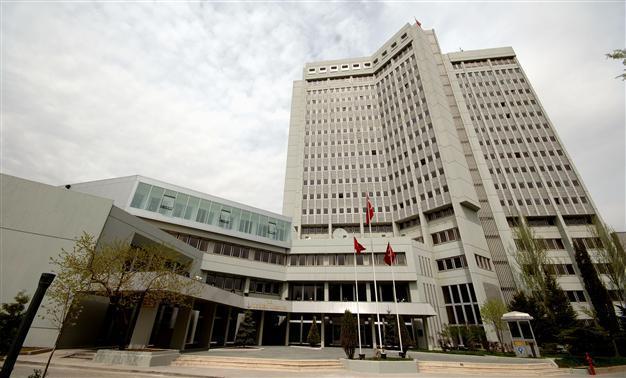Turkey slams Thailand for deporting Uighurs
ISTANBUL

CİHAN photo
Turkey has condemned Thailand for forcibly returning to China nearly 100 Uighur migrants who were sheltering in Thailand after escaping alleged Chinese oppression in Xinjiang in the wake of a violent attack against Bangkok’s consulate in Istanbul over the deportations.
“We are upset to hear of the return 115 of our consanguineous Uighur Turks in Thailand to a third country without their consent,” the Turkish Foreign Ministry Information Department said July 9.
The Foreign Ministry accused the Thai government of acting against international regulations that regulate the status of refugees, saying, “Despite our numerous initiatives to related international organizations, we condemn Thailand’s improper action, which is against international humanitarian law,” Turkey’s state-run Anadolu Agency reported on July 9.
The move came a day after Thailand sent back to China around 100 Uighurs who fled Chinese oppression against Uighurs living in the Xinjiang Autonomous Region, also known as East Turkestan.
Col. Weerachon Sukhondhapatipak, a Thai government deputy spokesperson, told Reuters on July 9 that Thailand sent around 100 Uighurs back to China on July 8.
“Thailand has worked with China and Turkey to solve the Uighur Muslim problem. We have sent them back to China after verifying their nationality,” he said.
Several rights groups and international organizations criticized the decision while China’s treatment of Uighurs remains a sensitive topic for Turkey.
“It is very shocking and disturbing that Thailand caved in to pressure from Beijing,” Sunai Phasuk, a Thailand researcher at Human Rights Watch, told Reuters. “In China they can face serious abuses including torture and disappearance.”
The U.N. refugee agency said it was alarmed by Thailand’s decision to deport the Uighurs. “We are shocked by this deportation of some 100 people and consider it a flagrant violation of international law,” said Volker Türk, the UNHCR’s assistant high commissioner for protection.
Thai Prime Minister Prayut Chan-o-cha reportedly defended the decision to forcibly return nearly 100 Uighur Muslim migrants to China despite rights groups’ concerns they could face ill-treatment upon their return, saying if they encountered any problems it was not Bangkok’s fault.
Prayut also held out the possibility of shutting the Thai embassy in Turkey after protesters attacked the honorary consulate in Istanbul, smashing windows and ransacking parts of the building over the expulsion of the Uighurs back to China.
Thailand’s expulsion of more than 170 Uighurs identified as Turkish citizens to Turkey and nearly 100 others identified as Chinese to China unleashed street protests across Turkey as the country has ethnic and linguistic ties to the Uighurs.
A pro-Uighur group attacked the Thai Consulate in Istanbul late July 8 over Thailand’s purported expulsion of Uighurs back to China.
Around 200 people gathered outside the consulate building at around 11 p.m. as they heard that some 200 Uighurs who fled alleged repression in Xinjiang would be sent back to China.
After a public statement, the group began to attack the building, hurling stones and chanting “Allah-u Akbar.” The assailants later broke into the building and scattered files and documents across the street. An assailant also cut the rope of the Thai flag after climbing the flagstaff.
Riot police later arrived at the scene and detained nine people from the group. After a while, the group performed prayer outside the street.
The attack on the Thai consulate is the latest in a string of ultranationalist attacks on Asians over China’s alleged mistreatment of Uighurs. Nationalists have so far attacked two Chinese restaurants in Istanbul, one of which was run by a Turk and employed a Uighur cook, while also roughing up Korean tourists on the supposition that they were Chinese. Nationalist Movement Party (MHP) leader Devlet Bahçeli later downplayed the latter attack, saying it was difficult to differentiate between Koreans and Chinese since they “both have slanted eyes.”
